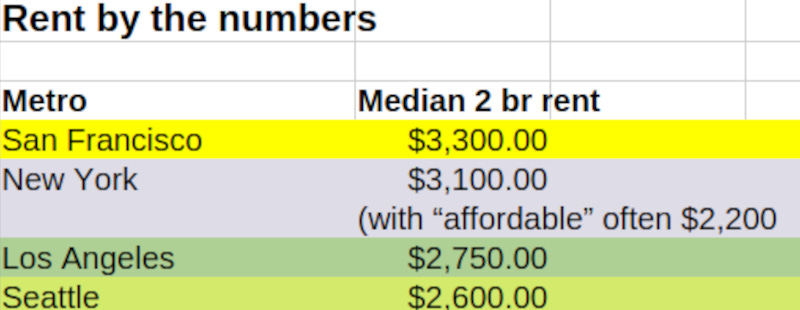Affordable for whom? The lie behind luxury “affordable housing”
Across the country, “affordable housing” often means luxury units priced far beyond reach. Here’s why the term has lost its meaning—and what we can do to take it back.
“Affordable” has become the housing world’s ‘gluten-free’ — slapped on anything, regardless of what’s inside.
I was walking through Greenville, my corner of Jersey City, when a shiny new mid-rise caught my eye. The banner blared:
“Luxury Living Starting at $2,400!”
Cute.
Before COVID-19, you could rent a one-bedroom in Greenville for about $1,200. Now, $1,750 is the “bargain” rate — and that’s after prices cooled from a pandemic peak north of $2,200. For plenty of my neighbors, that’s 30–35% of their income gone before they’ve even bought groceries. And here’s the kicker: Greenville used to be the cheap part of town.
Sound familiar? That’s because this isn’t just my block’s problem. This is the story of housing in America right now: a giant bait-and-switch where “affordable” is a marketing term with all the sincerity of “all natural” on a bag of neon-orange snack chips.
The numbers don’t lie — but developers do
Across the country, rents have gone feral. The National Low Income Housing Coalition’s Out of Reach report for 2024 spells it out: to afford a modest two-bedroom without being “rent-burdened,” the average full-time worker needs to earn $28.58 an hour.
The federal minimum wage? Still stuck at $7.25 — a rate unchanged since Obama’s first term.
Even in states with higher minimums, paychecks aren’t keeping up.
Meanwhile, in poorer metros — Brownsville, TX; Pine Bluff, AR; McAllen, TX — incomes are under $40k, but rents are still climbing like they’ve got something to prove.
The AMI Shell Game
Part of the trick is baked right into policy. “Affordable” is tied to Area Median Income (AMI) — a number padded by the salaries of your richest neighbors. In Hudson County, NJ, the 2024 AMI for a family of four is over $96,000.
So when a unit is “affordable” to households earning 80% of AMI, it can still rent for more than $2,000/month.
Affordable for whom? Certainly not the bus driver getting the tech worker to their office.
The Developer-to-English Dictionary
If you’ve been to a planning board meeting lately, you’ve heard the buzzwords. Let’s decode:
Workforce housing – Only if your “work” comes with stock options.
Mixed-income – 90% luxury, 10% PR spin.
Attainable housing – Not without a co-signer and a lucrative side hustle.
These terms get trotted out to soothe public pushback while the actual “affordable” units are priced to keep out the very people the term is supposed to serve.
A national housing joke — without a punchline
From 2020 to 2025, rents rose about 30% nationwide — a pace usually reserved for things like avocado prices after a bad crop year. Wages? Not so much.
This is why your bartender in Denver has three roommates, your cousin in Atlanta moved back in with your aunt, and the “affordable” studio in Chicago still eats half a teacher’s paycheck.
And yet, city after city hands out tax breaks to developers building towers with rooftop pools and dog spas, as long as they sprinkle in a handful of units technically below market rate.
We’re supposed to applaud while public subsidies bankroll buildings we can’t afford to live in.
What you can actually do (besides ranting on the internet)
Show up at city council and planning board meetings — developers hate sunlight almost as much as bad ROI.
Submit public comments on any housing proposal using federal or state dollars — those are your tax dollars, after all.
Join or start a neighborhood coalition — collective noise gets noticed faster than solo outrage.
Bottom line
“Affordable housing” has been stripped of meaning by people who know exactly what they’re doing. My neighborhood’s Greenville story is just one tile in a massive national mosaic of rising rents, stagnant wages, and policy sleight of hand.
Until we stop letting “affordable” be a PR line and start making it a right, we’ll keep living in a country where $2,400 for a one-bedroom is pitched as a bargain — and people nod like it’s reasonable.




